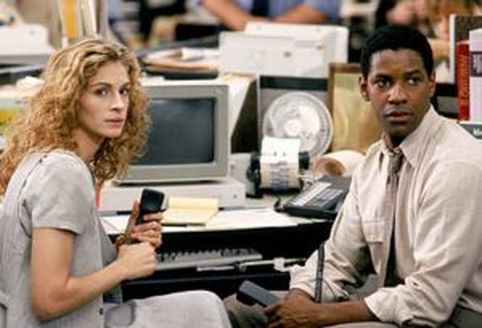B- | A law student and a journalist investigate political assassinations. Directed by Alan J. Pakula Starring Julia Roberts and Denzel Washington Initial Review by Jon Kissel |

In searching for a reason why two Supreme Court justices would be assassinated, Julia Roberts’ Darby Shaw is the only one not fooled by the culture wars. It might have figured it out in the coming days or weeks, but someone has to be first. It was money all along, something the film admirably withholds until the 80 minute mark. The Pelican Brief resists exposition until its appropriate, allowing the viewer to focus on the immediate threat to Darby’s life before the larger plot can unfold. She might be a little too competent in evading the various goons and assassins that are after her, but Roberts plays her with enough shock and humanity to maintain a level of buy-in. She makes enough mistakes to keep her believable, and because this is a movie, the film saves her through happenstance where the real version probably wouldn’t have made it. Even with those rescues, Roberts constant low-level panicked state in the first hour sells Darby as an ordinary person thrust into extraordinary circumstances. This is one of my favorite of her performances, as it lacks the cutesiness of her early career and the smugness of her later years.
The Pelican Brief is notable in that Denzel is both overshadowed by his co-star while also somewhat fading into the background. Workmanlike is a rare setting to find him turned to, but that’s where he is here. I can’t recall a scene that he notably improves. He’s not bad, but he’s putting forward minimal effort. For that matter, the rest of the cast suffers from the same problem, except Gray is played by one of the most recognizable actors in cinema and the rest are not. I didn’t figure out who was what government official until the film was ending, a side effect of the minimal exposition that moved the script from an admirable reluctance to hold the viewer’s hand into a frustrating opacity.
Though the cast blends together with low-key performances, Pakula’s direction gives The Pelican Brief enough flare to carry it through. He gives the film a suffocating sense of surveillance, like anyone could be a threat, and then he gives Darby no dialogue to illuminate her thought process while she’s on the lam. This invites the viewer to think about what they would do in a similar situation, always a fun and engaging part of films. Pakula doesn’t need any of those Tony Scott, Enemy of the State, obtrusive camera pans either. His work around Khamel (Stanley Tucci) is also masterful. The scene in which Verheek (John Heard) is killed is flawless, first showing the viewer that his phone is bugged and then going on to show that Khamel is in the closet, waiting for the perfect opportunity. This is classic Hitchcockian bomb-under-the-table filmmaking, and something I did not expect from a Grisham adaptation.
Shockingly, The Pelican Brief wins the Denzel Trio. At well over two hours, I was bracing myself for a slog, but it kept me entertained and connected throughout its runtime. This might be my favorite Grisham adaptation, too, more subtle than the less-manipulative than A Time to Kill and larger in scope than The Client. This certainly doesn’t have the legacy of All the President’s Men, but Pakula kept up his skills in the decades after its release with this strong potboiler. B
 RSS Feed
RSS Feed